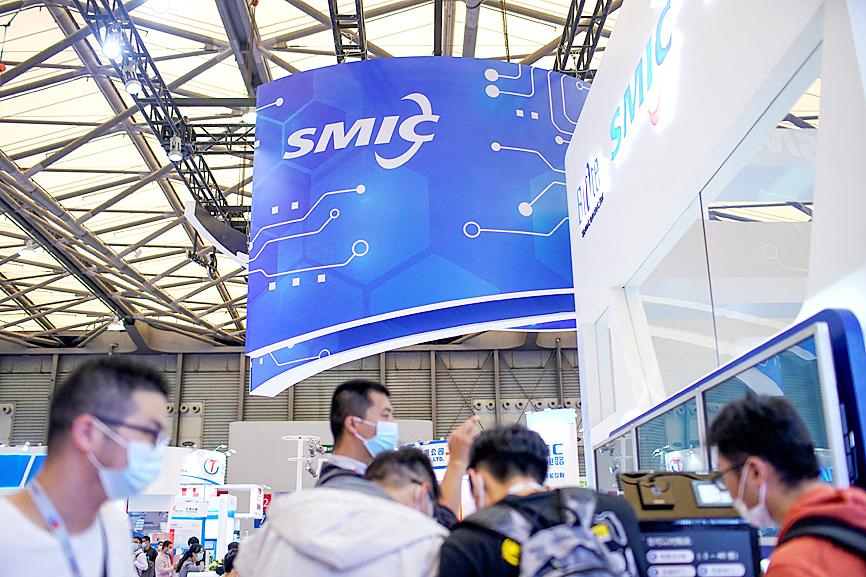Semiconductor Manufacturing International Corp (SMIC, 中芯) has likely advanced its production technology by two generations, defying US sanctions intended to halt the rise of China’s largest chipmaker.
The Shanghai-based manufacturer is shipping bitcoin-mining semiconductors built using 7 nanometer technology, industry watcher TechInsights wrote in a blog post on Tuesday.
That would be well ahead of SMIC’s established 14 nanometer technology, a measure of fabrication complexity in which narrower transistor widths help produce faster and more efficient chips.

Photo: Reuters
Since late 2020, the US has barred the unlicensed sale to the Chinese firm of equipment that can be used to fabricate semiconductors of 10 nanometers and beyond, infuriating Beijing.
A person familiar with the developments confirmed the report, asking not to be named as they were not authorized to discuss it publicly.
SMIC’s surprising progress raises questions about how effective export controls have been, and whether Washington can thwart China’s ambition to foster a world-class chip industry at home and reduce reliance on foreign technologies. It also comes as US lawmakers have urged Washington to close loopholes in its Chinese-oriented curbs and ensure Beijing is not supplying crucial technology to Russia.
The restrictions effectively derailed Huawei Technologies Co’s (華為) smartphone business by cutting it off from the tools to compete at the cutting edge.
Previously, SMIC has said that its core capabilities stand at 14 nanometers, two generations behind 7 nanometers, which is about four years behind the most advanced technology available from Taiwan Semiconductor Manufacturing Co (台積電) and Samsung Electronics Co.
SMIC has worked with clients on technologies more advanced than 14 nanometers as early as in 2020, it said on an earnings call that year.
China-based MinerVa Semiconductor Corp, which is named as SMIC’s customer in the TechInsights report, showcases a 7 nanometer chip on its Web site and said mass production began in July last year, without specifying the manufacturer.
SemiAnalysis lead analyst Dylan Patel was first to note the report.
Representatives of SMIC and MinerVa did not immediately respond to requests for comment.
The labels attached to generations of chip production technology have become increasingly controversial as they no longer represent dimensions of the microscopic transistors that give chips their electronic function. Companies have accused each other of mislabeling their products to make them appear more advanced than they actually are.
While the ability to produce a small number of chips using the next level of production technique signals that a company is making technological progress, what determines economic viability — under normal circumstances — is yield, or the percentage of every production run that is successful.
Intel Corp, once the leader in production technology, stalled on one type of production for five years because it could not get enough viable chips to make it profitable to introduce that node into mainstream production.
However, SMIC is not operating under standard business conditions.
It is critical to China’s ability to produce chips domestically, as the US tries to undercut the country’s tech advancements. Beijing might be willing to subsidize losses at domestic competitors, including SMIC, out of fear that its companies would not have access to key components.

UNCERTAINTY: Innolux activated a stringent supply chain management mechanism, as it did during the COVID-19 pandemic, to ensure optimal inventory levels for customers Flat-panel display makers AUO Corp (友達) and Innolux Corp (群創) yesterday said that about 12 to 20 percent of their display business is at risk of potential US tariffs and that they would relocate production or shipment destinations to mitigate the levies’ effects. US tariffs would have a direct impact of US$200 million on AUO’s revenue, company chairman Paul Peng (彭雙浪) told reporters on the sidelines of the Touch Taiwan trade show in Taipei yesterday. That would make up about 12 percent of the company’s overall revenue. To cope with the tariff uncertainty, AUO plans to allocate its production to manufacturing facilities in

Taiwan will prioritize the development of silicon photonics by taking advantage of its strength in the semiconductor industry to build another shield to protect the local economy, National Development Council (NDC) Minister Paul Liu (劉鏡清) said yesterday. Speaking at a meeting of the legislature’s Economics Committee, Liu said Taiwan already has the artificial intelligence (AI) industry as a shield, after the semiconductor industry, to safeguard the country, and is looking at new unique fields to build more economic shields. While Taiwan will further strengthen its existing shields, over the longer term, the country is determined to focus on such potential segments as

Chizuko Kimura has become the first female sushi chef in the world to win a Michelin star, fulfilling a promise she made to her dying husband to continue his legacy. The 54-year-old Japanese chef regained the Michelin star her late husband, Shunei Kimura, won three years ago for their Sushi Shunei restaurant in Paris. For Shunei Kimura, the star was a dream come true. However, the joy was short-lived. He died from cancer just three months later in June 2022. He was 65. The following year, the restaurant in the heart of Montmartre lost its star rating. Chizuko Kimura insisted that the new star is still down

While China’s leaders use their economic and political might to fight US President Donald Trump’s trade war “to the end,” its army of social media soldiers are embarking on a more humorous campaign online. Trump’s tariff blitz has seen Washington and Beijing impose eye-watering duties on imports from the other, fanning a standoff between the economic superpowers that has sparked global recession fears and sent markets into a tailspin. Trump says his policy is a response to years of being “ripped off” by other countries and aims to bring manufacturing to the US, forcing companies to employ US workers. However, China’s online warriors